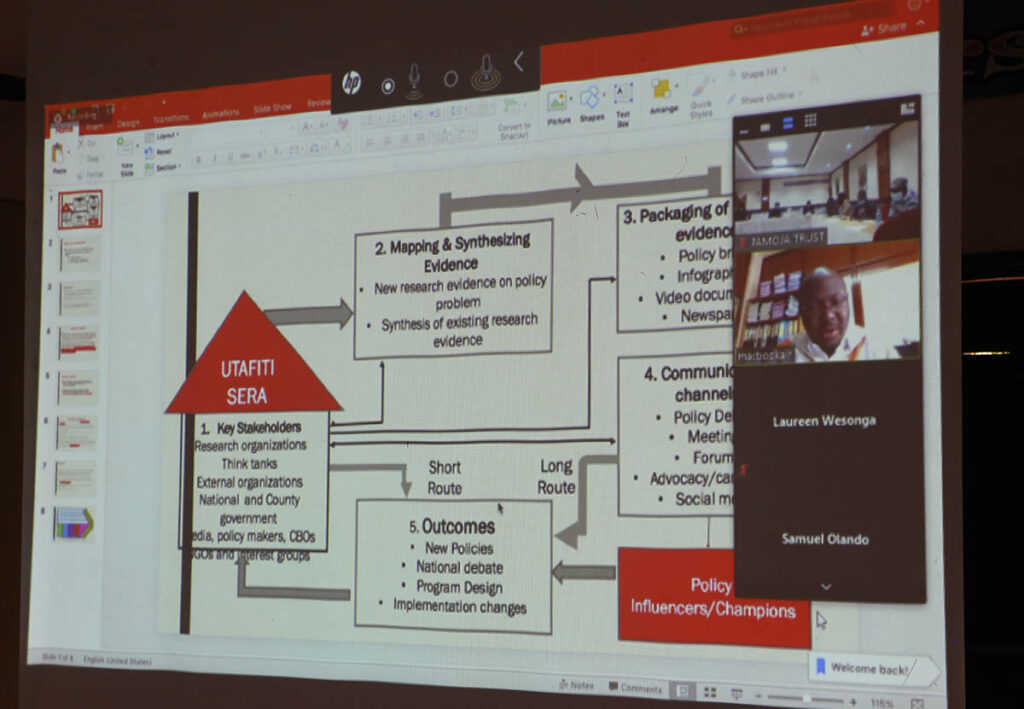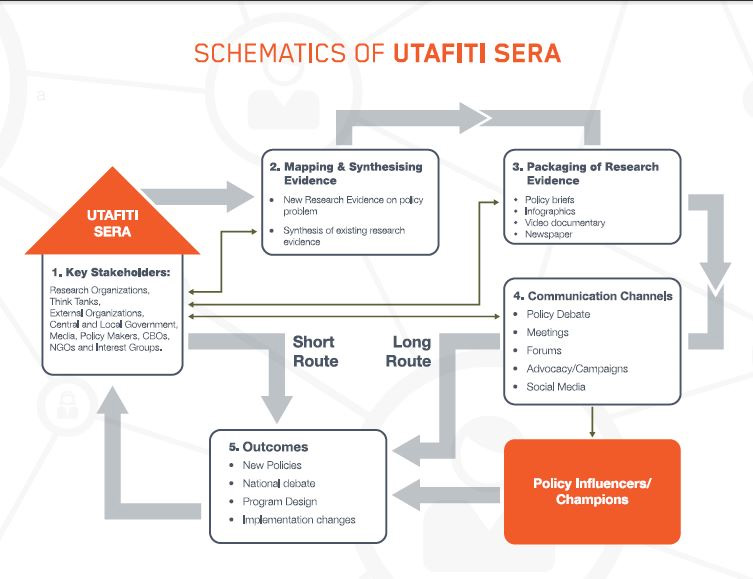Step 1: Mapping and Constituting the Utafiti Sera House
PASGR uses political economy analysis (PEA) to assess and provide a synthesis of the existing evidence and knowledge about a particular policy issue, identify gaps both in knowledge and policy, identify actors on various fronts – subject matter researchers and experts, policy actors and other important stakeholders, their interests and capacities, the existing power dynamics, and strategies for influencing evidence uptake in policy making The main aim of the PEA is to map existing studies that form preliminary evidence on the specific policy issue and helps identify entry points for additional evidence and policy engagement.
Based on the mapping analysis, PASGR holds meetings with the key stakeholders and invites them to the ‘Utafiti Sera House’.
Step 2: Identify Host Institution
As the facilitator of Utafiti Sera, PASGR, identifies a like-minded policy think tank, advocacy or practicing organization in a country to host the programme. The Host Institution is responsible for infusing local context and taking lead in the implementation of house activities.
Step 3: Commissioning research on the thematic subject and translating them to actionable policy evidence
Once the policy challenge or the knowledge gap is identified in the House, PASGR works with partners to commission studies, to synthesize existing knowledge as well as rapidly provide new knowledge on the issue and present the findings to the Utafiti Sera House. Forums include roundtable discussions, policy dialogue sessions, workshops and conferences.
Step 4: Organizing policy engagement forums
Forums are organized to discuss issues for which research evidence is available. Usually, the first forum focuses on the design and building of the Utafiti Sera House and deliberating on the specific policy issues and activities of the house. Based on the discussions and consensus, the Utafiti Sera House makes a determination on specific issues that require immediate policy action, develops short and medium term objectives and series of activities towards realization of the set objectives.
Step 5: Packaging and Dissemination of Research Evidence
Both conventional and new media are used to disseminate research evidence. This includes short video documentaries; Policy Alerts and Briefs; Newspaper Articles; Op-Eds; Tweeters; Facebook, Google plus and other social media platform.
Step 6: Use of Policy Champions
In many cases, we have found that policy issues produce their champions. These are important agents either within the Utafiti Sera House or outside of it. The process engages and mobilizes them with the necessary information.
Step 7: Networking and conferences
Utafiti Sera also engages in inter-house activities through conferences and networking forums to share experiences, draw lessons and build communities around the available evidence.

 Utafiti Sera is a Swahili phrase, meaning Research Policy. It is a dedicated and well thought out scheme that builds, supports, and enhances communities of researchers and policy actors working together to ensure evidence-informed decision making (EIDM). The communities work to ensure appropriate and negotiated policy actions and evidence uptake occur either through programmes, legislations, high-quality policy debates, policy design or administrative and other forms of civic actions around issues for which there is either research evidence or rigorous synthesis of available knowledge.
Utafiti Sera is a Swahili phrase, meaning Research Policy. It is a dedicated and well thought out scheme that builds, supports, and enhances communities of researchers and policy actors working together to ensure evidence-informed decision making (EIDM). The communities work to ensure appropriate and negotiated policy actions and evidence uptake occur either through programmes, legislations, high-quality policy debates, policy design or administrative and other forms of civic actions around issues for which there is either research evidence or rigorous synthesis of available knowledge.